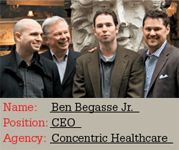- Sustainability
- DE&I
- Pandemic
- Finance
- Legal
- Technology
- Regulatory
- Global
- Pricing
- Strategy
- R&D/Clinical Trials
- Opinion
- Executive Roundtable
- Sales & Marketing
- Executive Profiles
- Leadership
- Market Access
- Patient Engagement
- Supply Chain
- Industry Trends
Ben Begasse Jr., Concentric Healthcare
The model the industry and the agencies have operated under is broken. I've had phone calls over the last three weeks from both biologic and traditional pharma clients. And all of them were looking for effectiveness in their marketing strategies. And in every case digital was a part of that thinking, whether it was digital to the patient, digital to the physician, or even digital to their sales reps. I believe healthcare's going to be almost 100 percent digital in five years.
The model the industry and the agencies have operated under is broken. I've had phone calls over the last three weeks from both biologic and traditional pharma clients. And all of them were looking for effectiveness in their marketing strategies. And in every case digital was a part of that thinking, whether it was digital to the patient, digital to the physician, or even digital to their sales reps. I believe healthcare's going to be almost 100 percent digital in five years.

Sales reps are not an effective reach and frequency medium. The dramatic rise in the sales force size, and the importance of call frequency, took the quality out of the communication between the sales representative and the physician. It hurt the relationship. And it had very little boost in return on marketing, only a 10 percent increase in sales.
A great job is initially done training reps on disease states and product information and competitive products, but follow-up education falls short. It's not budgeted in. With the Internet, you can help increase the effectiveness of the sales force through continued tutelage on application: application of their medical knowledge; application of what they know their customer needs are. They would know then how and what resources could be used—a financial aid package or a risk management practice or even a patient program. If they did that, then you'd see the relationships between physicians and sales reps improve because it would be based on credibility, merit, and trust.
Pharma marketers have a plethora of data that either they don't know how to analyze or sift through, or they're restricted in doing so. They're not utilizing that data to provide a more customized, personal communication with those individual people. Whenever we're able to wrestle data away from a client, we find some type of trend to wrap a strategy around, and that ultimately propels the product forward. Everyone is very enamored of strategy, but it's how that strategy manifests in the form of tactical execution that makes it smart.
The skinny
Concentric Healthcare is an independent agency with five operating units. Pictured: Michael Sanzen, CCO; Ken Begasse Sr., CEO; Michael Devlin, executive VP, managing director of consumer; and Ken Begasse Jr., CEO.
Telephone: 212-633-9700
E-mail: info@concentric-rx.com
Web site: concentric-rx.com
What Every Pharma CEO Should Know About Unlocking the Potential of Scientific Data
December 11th 2024When integrated into pharmaceutical enterprises, scientific data has the potential to drive organizational growth and innovation. Mikael Hagstroem, CEO at leading laboratory informatics provider LabVantage Solutions, discusses how technology partners add significant value to pharmaceutical R&D, in addition to manufacturing quality.
Key Findings of the NIAGARA and HIMALAYA Trials
November 8th 2024In this episode of the Pharmaceutical Executive podcast, Shubh Goel, head of immuno-oncology, gastrointestinal tumors, US oncology business unit, AstraZeneca, discusses the findings of the NIAGARA trial in bladder cancer and the significance of the five-year overall survival data from the HIMALAYA trial, particularly the long-term efficacy of the STRIDE regimen for unresectable liver cancer.
